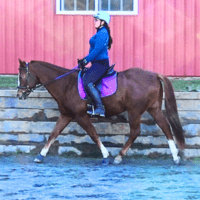So you want a horse, but you need to know how much it costs to buy a horse so you can budget and save first.
After owning 6 horses I can tell you from experience that the cost of buying a horse is just a small portion compared to the cost of keeping a horse.
Horse Ownership is not for everyone. But buying a horse is still an expense you need to plan and budget for.
So how much does a horse cost to buy? Horses come in a range of prices. You can find horses for sale from $1 to over a $1,000,000. Horses are most commonly priced between $1500-$10,000. The average horse now a day is around $5500.
You need to decide what your criteria is for a horse, learn about the types of horses available in different price ranges and determine what your horse buying budget is.
The purchase price of a horse is determined by a number of factors.
Most average casual riders or amateur competitors would pay no more than $10,000 for a horse.
Above that price you are looking at serious equestrians, professionals, competition barns, and people with the financial ability.
$10,000-and-up horses tend to have high-level potential, are successful show horses, are imported, and/or have fancy bloodlines with a family history of high-level competitive success.
These types of horses don’t change much in value despite the demands of the horse market, unlike horses being bought by backyard, first-time owners or hobby riders.
Many things affect the value of horses and over the past few years there has been a trend of sale prices going down but horse care expenses increasing.
This is because we have been having an economic dip, where less people are able to afford the cost of buying and keeping horses. This means more unwanted horses and fewer people willing or able to buy.
When the economy turns downward many times people end up not being able to afford their horses. For whatever the reason they have no choice but to sell their horses for cheap or even give their horse away.
READ POST>> Beginner’s Guide To Buying Your First Horse
How Much Horse’s Are Costing in 2021
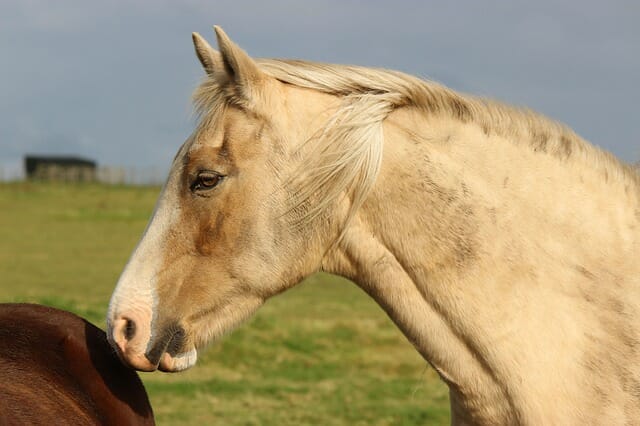
Let’s take a look at the price of horses in 2021.
Here is a chart showing 5 different horse sale price brackets with the amount of horses being sold in each of the price ranges.
Numbers Of Horses In Different Price Brackets
This is information I have gathered myself based off of 26,037 horses from 3 different top horse classified sites.
| Under $1500 | $1500-$5000 | $5000-$10,000 | $10,000-$20000 | Over $20000 | |
| Dream Horse | 583 | 3366 | 3230 | 1568 | 915 |
| Equine Now | 1774 | 2839 | 2047 | 968 | 364 |
| ehorses | 212 | 1132 | 2488 | 2629 | 1922 |
| Total | 2569 | 7337 | 7765 | 5165 | 3201 |
I am hoping it will give you a better idea of the amount of horses available in each price range when you go to look at horses for sale.
Based On the information most of the horses were priced between $5,000 to $10,000 followed by horses priced between $1500-$5000.
Pie Chart Showing the Percentages Of Sale Horses In Each Price Range
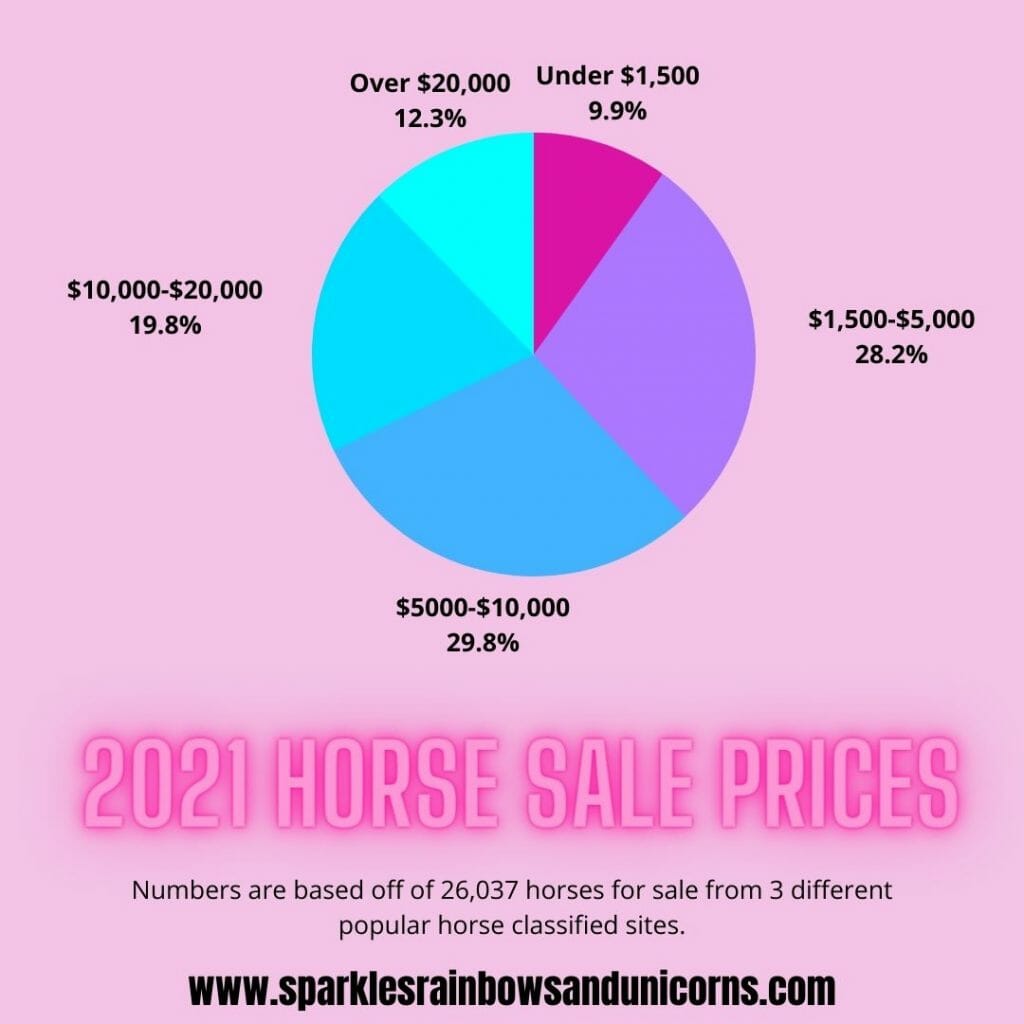
Price Ranges Based On Some Popular Horses Breeds
These are the vast price ranges that you can find these different breeds at. I listed a handful of breeds and have included the breeds price ranges as well as the number of horses that were for sale.
I put the most numerous horses for sale up top with it descending to the less available horses.
This is based on further research I did on the same 3 horse classified sites, this time with 15,525 horses total.
| Horse Breeds | Price Range | Amount Of Horses |
| American Quarter Horses | $0-$60,000 | 4906 |
| Thoroughbreds | $0-350,000 | 1775 |
| American Paint Horse | $1-$40,000 | 1549 |
| Hanoverian | $2,000-$140,000 | 1099 |
| Arabian | $500- $75,000 | 1097 |
| Andalusian | $2,500- $145,000 | 712 |
| Oldenburg | $1,000- $175,000 | 687 |
| Dutch Warmblood | $2,500- $100,000 | 547 |
| Tennessee Walking Horses | $500- $16,000 | 531 |
| Appaloosa | $3,500- $22,000 | 427 |
| Friesian | $1,500- $74,900 | 427 |
| Gypsy Horses | $1,000- $30,000 | 399 |
| Trakehner | $500- $75,000 | 372 |
| Morgans | $500- $50,000 | 229 |
| Mustangs | $125-$45,000 | 198 |
| American Saddlebred | $600- $70,000 | 110 |
| Percheron | $800- $20,000 | 106 |
| Irish Sport Horse | $5,000- $45,000 | 104 |
| Belgian Draft | $2,500- $12,000 | 70 |
| Clydesdale | $3,000- $15,000 | 63 |
| Fjord | $1,800- $110,000 | 59 |
| Shire | $4,000- $30,000 | 58 |
Factors That Affect The Value Of Horse’s Asking Price
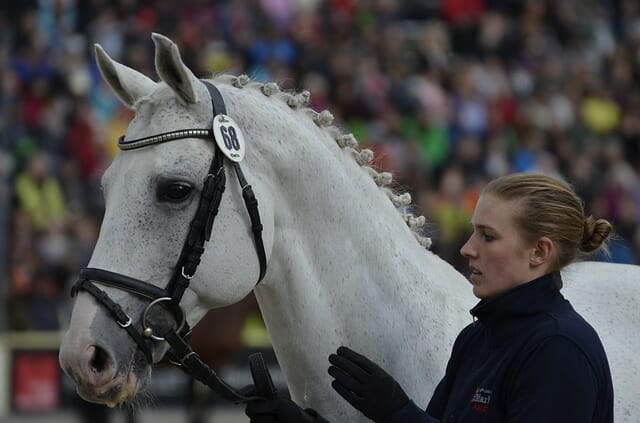
Here is a chart listing the different factors that go into the price of a horse. Keep in mind there are always exceptions but I am listing general information.
There are a lot of considerations that go into the pricing of a horse. There are some listed below that you may not have even thought of before.
| Factors Affecting Price | Explanation |
| Age | Horses are at their highest value age-wise between 3-13 years old. Young horses under 2 are usually lower value due to lack of training and experience. Horses start to lose value every year after they hit 14- 15 years old. |
| Breed | Some sought-after horse breeds are more expensive than others. For example, Spanish horses and Warmbloods. Horse breeds that can be found commonly less expensive for example grade horses, Arabians, appaloosas, quarter horses, paints, thoroughbreds coming out of their racing careers. |
| Height | The horse’s height can affect the asking price. In general horses between the height of 15.2-17h are most sought after |
| Sex | Although there are mare and stallion lovers, geldings are usually preferred for being more level-headed due to no hormone fluctuations. Stallions can be worth more if they are intended as high-quality studs for breeding. |
| Color | Color should not be a reason someone buys a horse but alas, people still do. Black, grey, buckskin, palomino, cremello, red dun, bay dun, and grulla, are some examples of colors people may be willing to pay more for. |
| Conformation | Conformation faults will lower the horse’s value. Certain conformation faults are worse than others. Some faults are more cosmetic and don’t severely affect the horse in the long run. |
| Horses Condition | A horse that is out of shape will lower its value. A horse that is underweight or overweight holds less value, but underweight is often seen as worse. A horse that is a good weight and fit increases the horse’s worth. |
| Bloodlines | There can be bloodlines within certain breeds that are highly sought after and this increases the value of the horse. |
| Temperament | High-strung, nervous, spooky, and aggressive horses have less value than horses that are bold, level-headed, friendly, willing, and have a good attitude. |
| Potential | A horse that has the potential to move up the levels will be worth more than a horse that has low potential who will stay as a pleasure or low-level horse. |
| Discipline/ Use Of The Horse | What the horse will be used for will affect the price. A backyard trail horse will be priced differently than a show hunter. A barrel racer will be priced differently than a thoroughbred racehorse. A retired racehorse will be priced differently than an active racehorse. |
| Level Of Training & Experience | The better trained and easier to ride the horse is the more it is worth. Untrained and green horses have a lower value. |
| Competition | Competition experience adds some value to a horse, no matter the placing, but a successful show horse can really increase the horse’s asking price. |
| Who Is Selling The Horse | A professional rider or competition barn will charge more, than the amateur equestrian that trying to sell them to a good home. |
| Reason For Selling | Is it because horse health problems, behavior issues, lameness? Is the owner unable to afford the horse? Does the barn need to make a stall available? Is the horse not a good fit for the owner? Does the owner not have time for the horse? Things to consider that can affect the value of the horse. |
| Location | Different parts of the USA and the world affect the cost of the horse. Mostly this is because of how cheap it is to keep a horse in a certain location. It’s also how much people are able or willing to pay in certain locations. A horse near a city at an expensive barn will sell higher than a horse from a barn in the middle of nowhere where it’s a quarter of the price to maintain the horse. |
| The Economy | Horse value goes up or down with the economy. The amateur, recreational, and backyard horses, get affected the most. |
How The Costs To Maintain A Horse Affect Asking Price
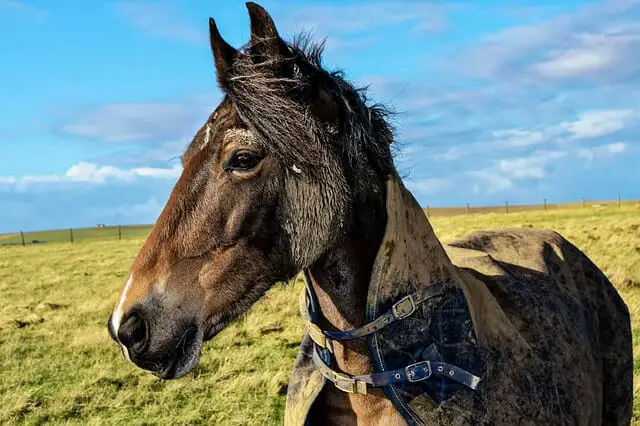
The rates horses are going for and the number of horses for sale almost always is directly connected to the cost of fuel, the condition of hay crops, and the cost of grain.
In the past when people needed to get rid of unwanted horses they would commonly end up in the slaughter houses.
Horses that were untrained, unsound, with behavioral issues, and/or elderly were commonly seen heading to these places, although nice horses you wouldn’t expect occasionally went as well.
Now slaughter is banned in the US (which is not a bad thing in my opinion… another time) there are more unwanted horses than before.
Although many times at auctions horses still get sent to slaughter located in either Mexico or Canada. A good reason to stop backyard and careless breeding. These kinds of horses are on the cheaper side to try to sell quick because the owners usually are struggling to afford the horse.
If you are a casual rider looking for your first horse expect to pay around $2500-$5000 for a decent horse.
It is possible to find your heart horse for a cheaper amount, but you will have more options to choose from.
The cheapest horse I bought was a $500 thoroughbred off the race track. He was not winning and they didn’t have the money to keep maintaining him. He ended up being one of the best horses I have owned. Although It took a lot of work and a few years of training him to turn him to be a fun, safe mount.
Keep in mind the bigger the budget you have to work with, the more options you have for horses.
Are Ponies Cheaper?
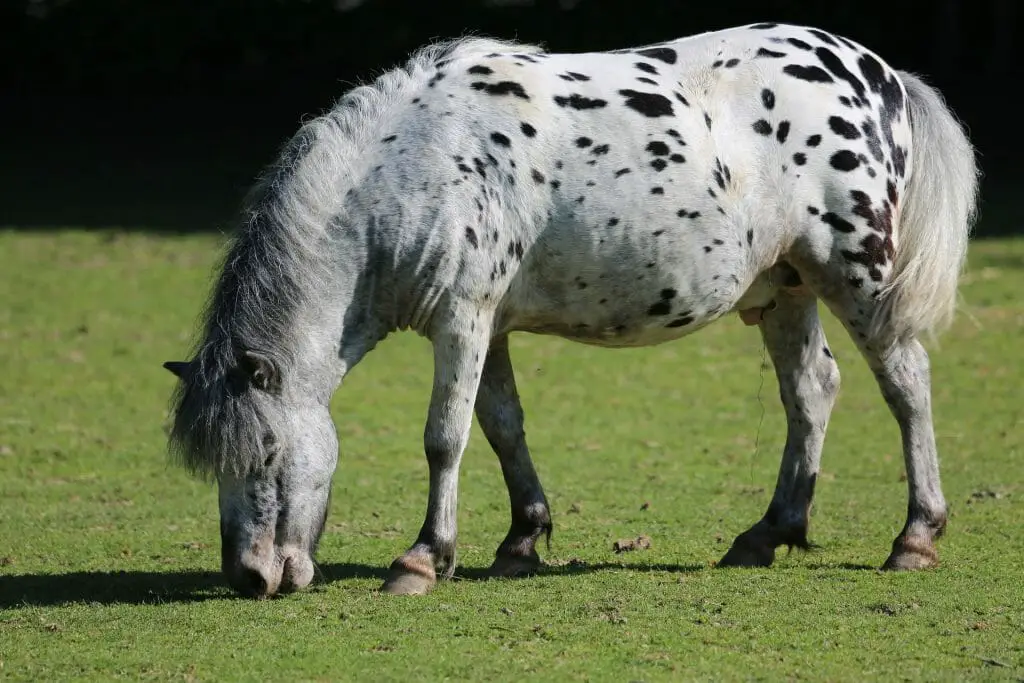
Ponies may be smaller than horses but they are not much cheaper to buy than a horse. Their upkeep cost may be cheaper in general but not as much as you might think.
The purchase price of a pony can be the same or even higher than a horse depending on the same factors that affect horse prices.
Buying a decent pony for a first-timer, you can expect to pay $1500 and higher.
The Truth About Free Horses
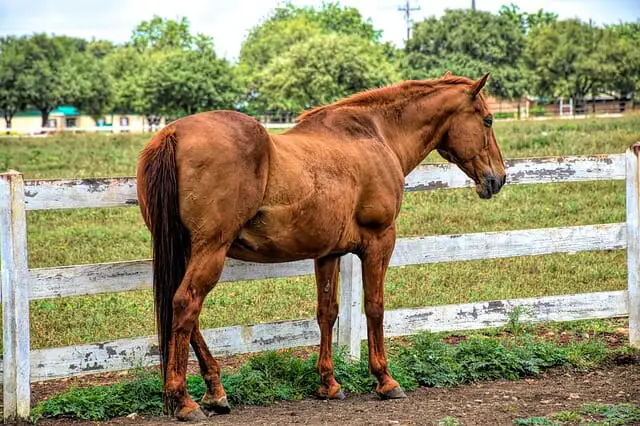
The saying “Never look a gift horse in the mouth,” is a saying for a reason, because free horses are free for a reason. They are either free because they have behavioral problems, soundness issues, a health problem, little or no training, are elderly, or are young with not much potential. It is common to find unsuitable horses being given away, so you need to be careful.
There is a chance you could get blessed with a wonderful free horse, like a schoolmaster.
If so it would most likely be a golden oldie who has a calm temperament, solid training, experience, and be sound with maintenance, where the owner just wants their horse to live out their days in a home where they will be loved.
This is however usually not the case. More often than not you are getting a horse with issues.
More likely you are getting a horse with a health or soundness problem. It may seem like you are getting a deal in the beginning.
A free horse wow, but then when all the vet bills start piling up and you realize the horse is unsuitable for you regret the choice you made.
What You Are Getting With a Cheap Horse
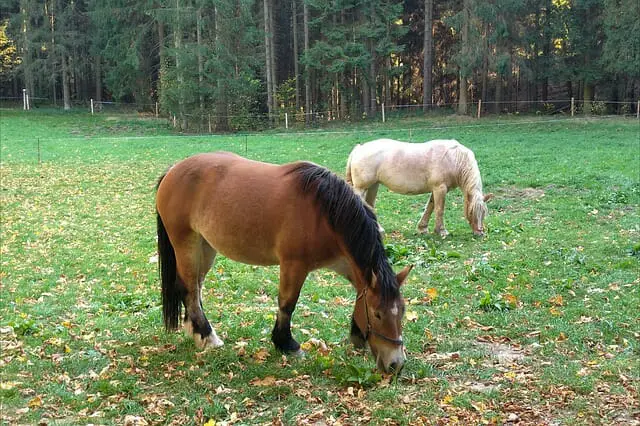
If you are planning to spend somewhere between $500- $1000 it is much the same predicament as getting a free horse.
You will often end up horses that have soundness issues, behavioral problems, poor conformation, young horses with little to no training. Some of the horses in this price bracket turn out to be stars, but it takes a person with a good eye for horses, the right skills and experience to deal with the problems that show up.
Every so often you will hear of underdogs going on to be success stories. Most of the time though, these horses are not the best for first-time horse owners.
You may be able to get a horse for cheap but you will pay for it in the long run with trainers, specialized foot care, vet bills, supplements, and/or medication costs.
What Makes A Horse Worth More
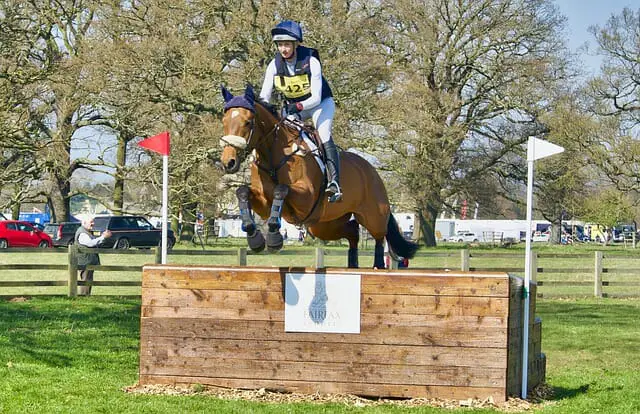
The type of horse that boasts a higher value has good manners, is sound, healthy, and well trained.
Conformation and pedigree also play a part in the horse’s worth but it is not as important if the other aspects mentioned are all there.
Less than perfect bloodlines or conformation is forgivable if the horse is safe, friendly, and fun to ride.
When you buy a horse at $3000 and up, you can usually assume that the horse has had some time and training put into it.
Although certain types of horses can start even higher priced sometimes with little to no training. Their value is in their bloodlines, conformation, and breed. Some breeds and bloodlines fetch higher prices than others.
A horse that is well trained, has a good show record, has good manners, stands well for the vet and farrier, is easy to tie, bathe, clip, trailer, basically a fun easy horse will fetch a higher price because these are the unicorns of horses.
A horse like this with no issues can cost you $5000 or more and $5000 is cheap for a horse like that.
You could possibly get a comparable horse cheaper, but more than likely the horse will be older coming toward the end of their riding career.
Keep in mind, there are always exceptions to the norm like most things. But the truth of the matter is the bigger the budget you have the more likely you will find the horse you are looking for.
Your Horse Buying Budget
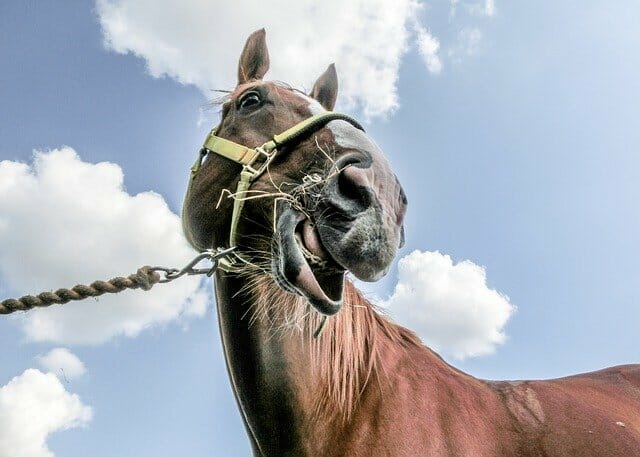
Once you figure out how much money you are willing to cough up to buy a horse, HALT!
You need to budget for more than the horse’s price tag.
Now that you know the price you can afford, there are 2 things you need to do.
Number 1: Horse’s Upkeep Expenses
Make sure you can afford the monthly and annual costs to properly care for a horse. Horse keeping expenses can vary greatly just as the horses purchase prices do.
Keeping the horse on your property at home or boarding at a farm will have an impact on the upkeep costs. Boarding costs are typically more money than keeping a horse at home. But if you keep a horse at home you need to make sure you have the proper facilities as well as enough land and space.
Here’s is a blog post I wrote about the costs of keeping your horse at home to help give you a better idea of what you are getting yourself into finance wise.
Number 2: Upfront Costs Of Buying A Horse
There are additional costs buying a horse aside from the initial purchase price. This means your budget and savings is going to have to cover more areas and the money you actually have to buy the horse is going to go down.
You Need To Factor These Things Into Your Start Up Budget (This is a list of what you need to save for before you buy the horse.)
- Pre-purchase vet exam also known as a vet check
- Sales tax (if there is any)
- The cost of transporting the horse
- Equine professional (if they helped you find the horse)
- Horse tack, supplies and equipment
- First months board
- Vet care (if horse is not up to date) vaccines, Coggins test, dental care.
- Farrier (if horse is due for hooves to be done)
- Emergency Fund (emergency vet care)
These things are not part of the purchase price of the horse but they are things you need to think about when making your horse buying budget.
Am I missing anything? Let me know down in the comments!
Unexpected expenses like emergency vet calls arise with owning horses that you need to be prepared for.
Horse Buying Budget Worksheet
To help you out if you are buying a horse or considering to do so, here is my horse buying budget worksheet.
Conclusion
You can now see that there is a lot that goes into the pricing of a horse. Horses can range from many different price points.
You typically get different quality horses based on what you pay.
If this is you first horse expect to pay between $2500-$5,000 for a decent low-level horse.
But if you have the money to pay more you will have more options and more quality horses to choose from.
The start-up costs of owning a horse can seem like lots of money, but the really expensive part is the costs of horse care.
Consider if you are really ready for the responsibility and commitment it takes to own a horse.
I would love to hear from you in the comments. What is your horse buying budget?
Right now I am just leasing because I am a busy mom. But one day I want to own a horse again. My purchase price budget will probably be around $3000… we will see.
Cheers, Kacey

